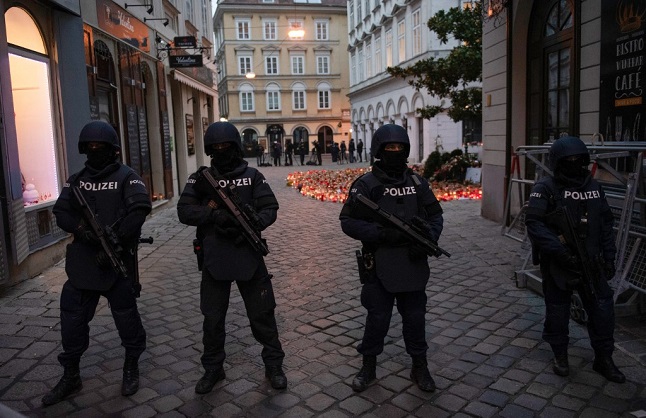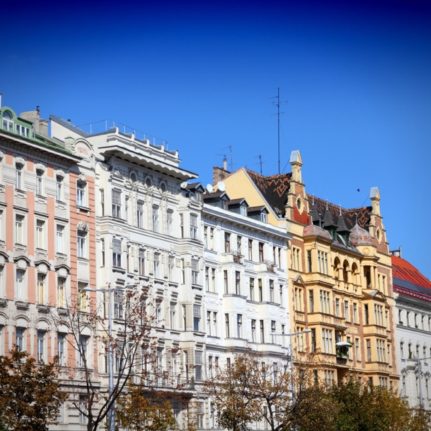Vienna will send €200 bonuses to help cushion rising energy costs
The City of Vienna announced more government assistance to cushion rising costs for residents.
Viennese households will receive €200 in a new “energy bonus’, as The Local reported. The administration said the bonus would benefit about two-thirds of all city homes.
Single households with a gross annual income of a maximum €40,000 or multi-person households with an income of up to €100,000 gross per year are entitled to receive the payment.
In December, every household in the capital should receive an information letter with a password they will need to use for an online application for the bonus. Once applied for, the money should arrive within a few days”.
READ MORE: Vienna Energy Bonus: How to get a €200 payout
Influenza vaccination appointments
The City of Vienna has made available 64,000 influenza vaccination appointments for December in the city’s vaccination centres and those of the ÖGK.
The City is investing a total of €9.9 million to be able to offer the flu vaccination campaign in Vienna free of charge again this year. The campaign will run until the end of the year unless an extension becomes necessary due to high demand.
The influenza vaccination campaign focuses on people aged over 65. This avoids multiple exposures to Covid-19 and the “real flu”. Chronically ill people, children and health or care workers are also among the priority target groups. However, influenza vaccination is also recommended to all other people.
READ ALSO: Reader question: How to get a flu vaccination in Austria?
Vienna starts inquiry committee over Wien Energie
Starting on December 2nd at the Vienna City Hall, the City Council’s investigative commission on the Wien Energie case will meet every two weeks.
On the initiative of the centre-right Austrian People’s Party (ÖVP) and the far-right Freedom Party (FPÖ), it will investigate the events surrounding the dramatic financial needs of Wien Energie that became known in the summer. The commission can summon people to testify and request documents.
They will focus on two issues.
The first concerns the extent to which Mayor Michael Ludwig and City Finance Councillor Peter Hanke have exercised their ownership rights regarding Wien Energie, which is wholly owned by the city via Wiener Stadtwerke. Specifically, the commission wants to know whether the two SPÖ politicians reacted in time and appropriately to the price increases in the electricity markets in the summer.
The second matter revolves around Ludwig’s emergency powers as head of the city, with which he granted Wien Energie loans totalling €1.4 billion. It is to be clarified whether this procedure was legally compliant and whether Ludwig should have informed committees such as the City Senate earlier.
READ ALSO: Why did Wien Energie ask for €6 billion from the Austrian government?
Terror trial continues
On November 2nd, 2020, a jihadist terrorist shot dead four people and injured more than 20 in the centre of Vienna before police forces killed him.
Now, the country is going through a complex trial involving six men who allegedly helped the shooter prepare for the attack started. The process first started in October, as The Local reported, but a final verdict is not expected until at least February.
In December, tricky trial stages are scheduled, including questioning people suspected of having sold weapons to the terrorist.
READ ALSO: Austria starts trial over Vienna jihadist shooting

This Human World Festival
The This Human World Festival is celebrating its 15th anniversary and it focuses on the theme of human rights. In four Viennese cinemas (Schikaneder, Topkino, Gartenbaukino, Stadtkino) and two other venues (Brunnenpassage, Brotfabrik) you can watch films that deal with human rights, current conflicts and crises from December 1st to 11th.
About 90 feature films, documentaries and short films await you – some of them will celebrate their Austrian premiere at the festival.
The aim of the film festival is to draw attention to political and social grievances in a sensitive, stirring and occasionally humorous way.
You can read more about the event HERE.
Harry Potter: The Exhibition
“Harry Potter: The Exhibition” is touring worldwide and the major exhibition about the wizard’s universe will get its first European location in Vienna on December 16th, 2022. The show will be housed in the METAStadt in the 22nd district (Dr.-Otto-Neurath-Gasse 3).
The ticket sale has already started on the official site of the exhibition and via oeticket. Tickets are available from € 24.90 for children (up to 12 years) and € 29.90 for adults (from 13 years).
Weihnachtsmärkte
Last year, many markets around the country were cancelled after a snap lockdown in November, although some events still went ahead with strict rules in place.
But this year, the Christmas markets are back in full swing without restrictions, so make sure you visit one (or two) to really get into the Christmas spirit. Austria’s most famous markets are in Vienna, like the Christkindmarkt in front of the Town Hall that runs from November 19th to December 26th.
The Viennese markets are drawing in thousands of tourists to the Austrian capital. Don’t miss out on all the Glüwein (even if it is more expensive this year), geröstete Kastanien and Weihnachtskugeln you can get.
FOR MEMBERS: IN PICTURES: A guide to the main Christmas markets in Austria
Public holidays
Besides Christmas (December 25th) and Stephan’s Day (December 26th), December 8th, when Catholics celebrate the Feast of the Immaculate Conception (Mariä Empfängnis), is also a public holiday in Austria.
Of course, there are also several celebratory dates in December. For example, every Sunday until Christmas is an Advent Sunday, and Austrian families commemorate it in many ways, including lighting up candles.
On December 4th, there is Barbaratag, while on December 5th, Krampus pays his visit to Austrian villages and cities. On the next day, December 6th, it’s time for St Nikolaus to bring chocolate and tangerines to children who were nice during the year.
Christmas Eve, Day, and St Stephen’s Day (December 24th, 25th and 26th) are important dates for Austrian traditions.
It’s also worth noting that Austrians celebrate Christmas on the evening of December 24th, usually with a family meal.
READ ALSO: Austrian Christmas traditions: The festive dates you need to know
New Year celebrations
Expect lots of fireworks on New Year’s Eve (Silvester) in Austria – and especially in Vienna.
In the capital, the bells ring out at St. Stephan’s Cathedral to welcome in the New Year, which is also broadcast on national television. This is followed by fireworks and some even take part in a communal waltz on Rathausplatz in front of the Town Hall.
But if you really want to celebrate New Year like an Austrian, then give a marzipan pig to your nearest and dearest. The little pigs represent a good luck charm and are handed out every year on New Year’s Eve.



 Please whitelist us to continue reading.
Please whitelist us to continue reading.
Member comments